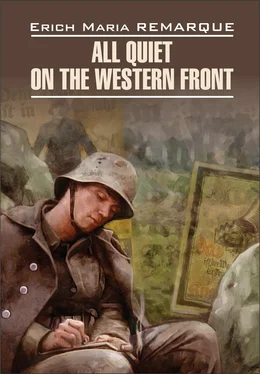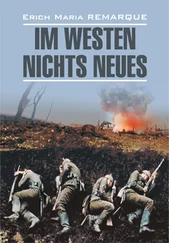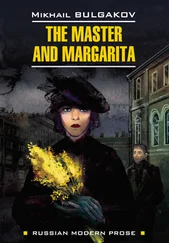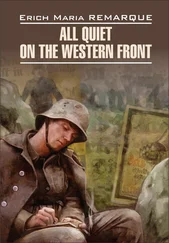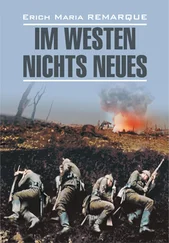We can all feel it when the heavy shelling rips away the parapet and churns into the bulkheads, shattering the topmost blocks of concrete. We hear the duller, angrier impact when a shell hits our trench, like the blow from the claws of some snarling beast of prey. By morning a few of the recruits are already green and throwing up. They haven’t had enough experience of it all yet.
Slowly an unpleasant grey light trickles into our posts and makes the flashes of the impacts look paler. It is morning. Now we can hear trench mortars exploding, in amongst the shellfire. They cause the worst devastation possible. Wherever one of those lands, all you get is a mass grave.
The reliefs go out and the observers stumble in, trembling and covered with dirt. One lies down in a corner without saying anything and starts to eat, the other, one of the older reservists, just sobs; he has been thrown over the parapet twice by the blast without suffering anything more than shell shock.
The recruits are looking at him. That sort of thing is contagious, and we have to keep an eye on it; already a few lips are starting to quiver. It’s a good thing that it is daylight; perhaps the attack will come this morning.
The shelling doesn’t die down. It is behind us as well. All around, as far as you can see, fountains of mud and iron are shooting up. They are raking a very broad belt indeed.
The attack doesn’t come, but the bombardment goes on. Gradually we become deaf. Hardly anyone speaks any more. It’s impossible to understand one another anyway.
Our trench has been shelled nearly to pieces. In several places there is less than a couple of feet of wall left standing, and it is full of holes, craters and piles of earth. A shell bursts just in front of our post. Immediately everything goes dark. We have been buried and have to dig ourselves out. After an hour the entrance is clear again, and we are a bit calmer because we have had something to occupy us.
Our company commander climbs in and reports that two of the dugouts are gone. The recruits calm down when they see him. He tells us that they are going to try to get food up to us tonight.
That sounds comforting. No one had given it any thought except Tjaden. Food is something else that might bring the outside world a bit closer – if food is going to be brought in, then it can’t be as bad as all that, reckon the recruits. We don’t contradict them, although we know that food is just as important as ammunition, and it is only for that reason that it has to be brought in.
But the attempt to fetch it fails. A second party sets out, but turns back as well. The last group contains Kat, but even he has to return empty-handed. No one can get through, a dog’s tail wouldn’t be thin enough to slip through that kind of fire.
We tighten our belts and chew each mouthful three times as long as usual. But it still isn’t enough; we are bloody hungry. I save myself a crust of bread; I eat the soft part and leave the crust in my pack; every so often I nibble at it.
The night is unbearable. We can’t sleep, we just stare in front of us and doze. Tjaden is sorry that we wasted the scraps of bread that had been gnawed on by the rats. He says we should have gone ahead and kept it, and that we would all eat it now. Water is short as well, but we are not quite so badly off on that score.
Towards morning, while it is still dark, there is a sudden commotion. A mob of fleeing rats storms into the dugout and they run up the walls. Our flashlights show up the chaos. Everyone screams and curses and starts hitting out. It is the working off of all the anger and frustration of all those long hours. Faces are distorted, arms flail, the rats squeak and it is hard for us to stop – we were almost on the point of setting about each other.
The sudden exertion has exhausted us. We lie down and wait again. It is a miracle that our dugout hasn’t had any casualties. It is one of the few deep dugouts still intact.
An NCO climbs down to us; he has some bread with him. Three men did manage to get through last night and fetch some provisions. They reported that the shellfire was constant and just as heavy all the way back to our gun emplacements. They say it is a mystery where the other side is getting so much artillery.
We have to wait, wait. Around midday something happens that I have been expecting to happen. One of the recruits cracks. I have been watching him for a long time, seeing the way he has been constantly grinding his teeth and clenching and unclenching his fists. We are all too familiar with those hunted, wild eyes. In the last few hours he seems to have quietened down, but it isn’t real. He has collapsed in on himself like a tree that is rotten inside.
Now he gets up and creeps quietly through the dugout, then rushes for the door. I turn over on to my side and ask, ‘Where are you off to?’
‘I won’t be a minute,’ he says, and tries to get past me.
‘Hang on for a while, the shelling is already dying down a bit.’
He listens and his eyes clear for a moment. Then they take on that dull shine again, just like a rabid dog, and he pushes me aside without saying anything.
‘Just a minute, chum!’ I shout. Kat sees what is going on. As the recruit pushes me, Kat grabs him and we hold on to him tightly.
Straight away he begins to rave. ‘Let go of me, let me out, I have to get out of here!’
He won’t listen, and flails out, spitting out words that are gurgling nonsense. It’s claustrophobia from being in the dugout, he feels that he is suffocating and has one basic urge: to get outside. If we let him go he’d run off somewhere and not take cover. He isn’t the first.
Because he is raging and his eyes are rolling, there is nothing for it but to hit him, so that he comes to himself. We do so quickly and without mercy and manage to get him sitting quietly again for the time being. The others turn pale when they see all this; let’s hope it scares them off doing the same. This concentrated artillery fire is too much for the poor lads; they’ve come straight from the recruiting depot into a bombardment that would give grey hairs even to one of the old hands.
The stifling air in the dugout gets on our nerves even more after this incident. It’s as if we were sitting in our own grave, just waiting for someone to bury us.
Suddenly there is a terrible noise and flash of light, and every joint in the dugout creaks under the impact of a direct hit – luckily not a heavy one, and one that the concrete blocks could withstand. There is a fearsome metallic rattling, the walls shake, rifles, steel helmets, earth, mud and dust fly around. Sulphurous fumes penetrate the walls. If we had been in one of the light shelters that they are building these days, instead of our solid dugout, we’d all be dead by now.
But even so the effect it has is bad enough. The recruit who had the fit earlier is raving again, and two more have joined in. One breaks away and runs for it. We have trouble holding the other two. I rush out after the one who ran away and I wonder if I should shoot him in the leg; then there is a whistling noise, I throw myself flat, and when I get up there are fragments of hot shrapnel, scraps of flesh and torn pieces of uniform spattered on the walls of the trench. I scramble back inside.
The first recruit seems to have gone completely crazy. If we let go of him he butts his head against the wall like a goat. Tonight we shall have to try to get him back into the rear zone. For the moment we tie him up securely, but in such a way that we can release him if there is an attack.
Kat suggests a game of cards; what else can we do, perhaps it will make things easier? But it is no good, we are listening to every impact that sounds close, we lose count and we lead the wrong suits. We have to give up. It’s as if we were sitting inside a massive echoing metal boiler that is being pounded on every side.
Читать дальше
Конец ознакомительного отрывка
Купить книгу
